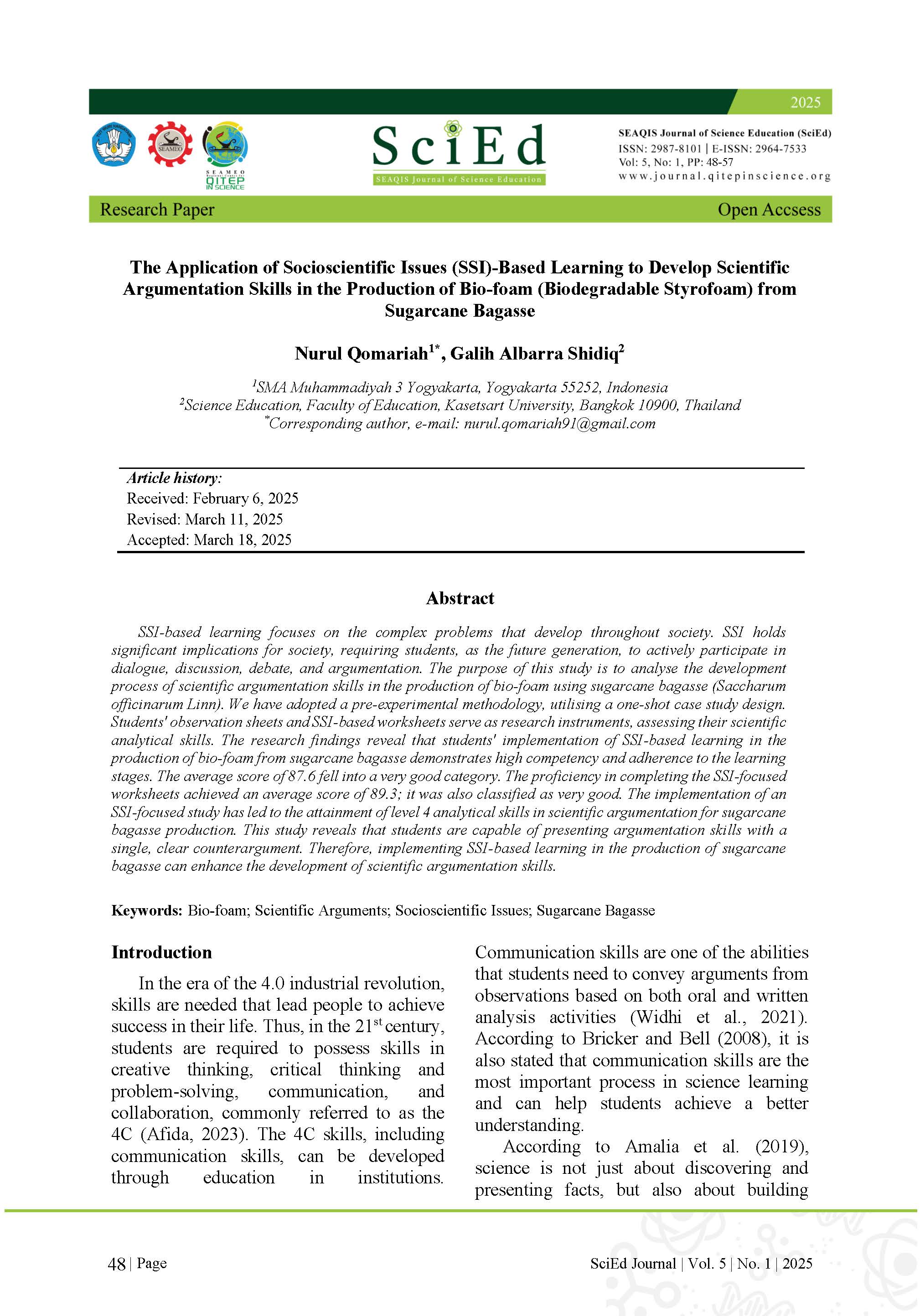The Application of Socioscientific Issues (SSI)-Based Learning to Develop Scientific Argumentation Skills in the Production of Bio-foam (Biodegradable Styrofoam) from Sugarcane Bagasse
DOI:
https://doi.org/10.58249/sjse.v5i01.171Keywords:
bio-foam, scientific arguments, socioscientific issue, sugarcane bagasseAbstract
SSI-based learning focuses on the complex problems that develop throughout society. SSI holds significant implications for society, requiring students, as the future generation, to actively participate in dialogue, discussion, debate, and argumentation. The purpose of this study is to analyse the development process of scientific argumentation skills in the production of bio-foam using sugarcane bagasse (Saccharum officinarum Linn). We have adopted a pre-experimental methodology, utilising a one-shot case study design. Students' observation sheets and SSI-based worksheets serve as research instruments, assessing their scientific analytical skills. The research findings reveal that students' implementation of SSI-based learning in the production of bio-foam from sugarcane bagasse demonstrates high competency and adherence to the learning stages. The average score of 87.6 fell into a very good category. The proficiency in completing the SSI-focused worksheets achieved an average score of 89.3; it was also classified as very good. The implementation of an SSI-focused study has led to the attainment of level 4 analytical skills in scientific argumentation for sugarcane bagasse production. This study reveals that students are capable of presenting argumentation skills with a single, clear counterargument. Therefore, implementing SSI-based learning in the production of sugarcane bagasse can enhance the development of scientific argumentation skills.
References
Acar, O., & Patton, B. R. (2012a). Argumentation and Formal Reasoning Skillsin an Argumentation-Based Guided Inquiry Course. Procedia-Social and Behavioral Sciences, 46(10), 4756–4760.
Afida, R. N. (2023, June). Literature review: Peran guru dalam membangun ketrampilan 4c siswa dengan pembelajaran berdiferensiasi. In Prosiding Seminar Nasional Pascasarjana 6(1), 643-647.
Afrilya, N. A. (2020). Pengaruh Penerapan Pendekatan Socio Scientific Issues (SSI) Terhadap Kemampuan Literasi Sains Siswa pada Materi Minyak Bumi (Doctoral dissertation, Universitas Islam Negeri Sultan Syarif Kasim Riau).
Aisya, N., Wibowo, Y., & Aminatun, T. (2017). The Influence of Socio-Scientific Issues on Reflective Judgment of High School’s Student in Ecosystem Material. Jurnal Bioedukatika, 4(2), 1-14.
Amalia, R., Rahmawati, Y., & Budi, S. (2019). Pengembangan keterampilan argumentasi calon guru kimia melalui pendekatan socio critical and problem oriented. JTK (Jurnal Tadris Kimiya), 4(1), 91-104.
Bahri, S., Aji, A., & Yani, F. (2019). Pembuatan Bioetanol dari Kulit Pisang Kepok dengan Cara Fermentasi menggunakan Ragi Roti. Jurnal Teknologi Kimia Unimal, 7(2), 85.
Bahri, S., Fitriani, F., & Jalaluddin, J. (2021). Pembuatan Biofoam Dari Ampas Tebu Dan Tepung Maizena. Jurnal Teknologi Kimia Unimal, 10(1), 24-32.
Bricker, L. A., & Bell, P. (2008). Conceptualizations of argumentation from science studies and the learning sciences and their implications for the practices of science education. Science Education, 92(3), 473–498.
Burke, B. N., Reed, P. A., & Wells, J. G. (2014). Integrating technology and engineering in a STEM context.
Creswell, J. W. (2012). Educational Research: Planning, Conducting, and Evaluating Quantitative and Qualitative Research (4th ed.). Boston: Pearson.
Driver, R., Newton, P., & Osborne, J. (2000). Establishing the norms of scientific argumentation in classrooms. Science education, 84(3), 287-312.
Erduran, S., Osborne, J., & Simon, S. (2005). The role of argumentation in developing scientific literacy. Springer, 1, 381–382.
Farida, I. (2015). Profil Keterampilan Argumentasi Siswa Pada Konsep Koloid Yang Dikembangkan Melalui Pembelajaran Inkuiri Argumentatif. EDUSAINS, 6(1), 31–40.
Hakyolu, H., & OganBekiroglu, F. (2011). Assessment of Students’ Science Knowledge Levels and their Involvement with Argumentation. International Journal for Cross-Disciplinary Subjects in Education, 2(1), 264–270.
Hanifah, E., Setiono, S., & Nuranti, G. (2021). Pengaruh Model Socio-Scientific Issue Terhadap Keterampilan Memecahkan Masalah Menggunakan Aplikasi Powtoon pada Materi Perubahan Lingkungan. Biodik, 7(4), 18–28.
Hasanah, H. (2017). Teknik-Teknik Observasi (Sebuah Alternatif Metode Pengumpulan Data Kualitatif Ilmu-ilmu Sosial). At-Taqaddum, 8(1), 21.
Novianti, D., Mulyani, B., & VH, E. S. (2022). Analisis Kemampuan Argumentasi Ilmiah Peserta Didik Kelas X MIPA SMA Negeri 2 Surakarta Pada Materi Hukum Dasar Kimia. Jurnal Pendidikan Kimia, 11(1), 75–81.
Osborne, J., Erduran, S., & Simon, S. (2004). Enhancing the quality of argumentation in school science. Journal of Research in Science Teaching, 41(10), 994–1020.
Qodriyah, A. L. (2018). Analisis Wacana Argumentasi Peserta Didik pada Diskusi Isu-Isu Sosiosaintifik. Skripsi. Jakarta: Ilmu Tarbiyah dan Keguruan UIN Syarif Hidayatullah).
Rahayu, Sri. (2019). Socioscientific Issues : Manfaatnya dalam Meningkatkan Pemahaman Konsep Socioscientific Issues : Manfaatnya dalam Meningkatkan Pemahaman Konsep Sains , Nature of Science (NOS) dan Higher Order Thinking Skills (HOTS). Seminar Nasional Pendidikan IPA UNESA, October, 2.
Rostikawati, D. A., & Permanasari, A. (2016). Rekonstruksi bahan ajar dengan konteks socio-scientific issues pada materi zat aditif makanan untuk meningkatkan literasi sains siswa. Jurnal Inovasi Pendidikan IPA, 2(2), 156.
Sandoval, W. A., & Millwood, K. A. (2005). The quality of students' use of evidence in written scientific explanations. Cognition and instruction, 23(1), 23-55.
Shaughnessy, M. F., Varela, M., & Liu, Z. (2017). Critical Thinking in Science: What Are the Basics? World Journal of Educational Research, 4(4).
Siska, S., Triani, W., Yunita, Y., Maryuningsih, Y., & Ubaidillah, M. (2020). Penerapan pembelajaran berbasis socio scientific issues untuk meningkatkan kemampuan argumentasi ilmiah. EduSains: Jurnal Pendidikan Sains & Matematika, 8(1), 22-23.
Skills, P. f. s. C. (2009). P21 framework definitions: ERIC Clearinghouse.
Sugiyono. (2017). Metode penelitian kuantitatif, kualitatif, dan R&D. Alfabeta.
Tibalia, E. M. S. E. (2024). Evaluasi Biodegradable Food Container Pengganti Styrofoam dari Jerami Padi dan Ampas Tebu Dengan Penambahan Kitosan dan Kulit Jeruk (Doctoral dissertation, Universitas Gadjah Mada).
Widhi, M. T. W., Hakim, A. R., Wulansari, N. I., Solahuddin, M. I., & Admoko, S. (2021). Analisis keterampilan argumentasi ilmiah peserta didik pada model pembelajaran berbasis toulmin’s argumentation pattern (TAP) dalam memahami konsep fisika dengan metode library research. PENDIPA Journal of Science Education, 5(1), 79-91.
Zeidler, D. L. (2016). STEM education: A deficit framework for the twenty first century? A sociocultural socioscientific response. Cultural Studies of Science Education, 11(1), 11-26.
Zeidler, D. L., Sadler, T. D., Simmons, M. L., & Howes, E. V. (2005). Beyond STS: A research-based framework for socioscientific issues education. Science Education, 89(3), 357–377.

Downloads
Published
Issue
Section
Citation Check
License
Copyright (c) 2025 SEAQIS Journal of Science Education

This work is licensed under a Creative Commons Attribution 4.0 International License.

This work is licensed under a Creative Commons Attribution 4.0 International License.














